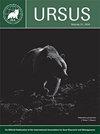Harvest rates and cause-specific mortality of American black bears in the wildland–urban interface of the Mid-Atlantic region, USA
IF 0.8
4区 生物学
Q4 ZOOLOGY
引用次数: 7
Abstract
Abstract: There is a salient belief that bears (Ursidae) using the wildland–urban interface (WUI) are not vulnerable to harvest, and therefore, hunting is an ineffective management tool for bears in the WUI of the eastern United States; however, this question remains untested. We fit and monitored 116 American black bears (Ursus americanus; hereafter, black bear) with Global Positioning System–Global System for Mobile Communications collars in 9 municipalities in New Jersey, Pennsylvania, and West Virginia, USA, during 2010–2013 to determine (1) whether bears in the WUI were vulnerable to harvest; (2) if so, at what rates are they harvested; and (3) what are other cause-specific mortalities in the WUI. Harvest mortality did occur on the monitored bears in the WUI during our study. Harvest mortality rates were lower than statewide tag-return harvest rates from New Jersey and higher 3 of 4 years in Pennsylvania. The proportion of bears that was harvested was similar for juvenile males (30%), adult males (36%), and adult females (29%). Annual survival was variable (range = 40–92%), but was similar among adult males and females. Euthanasia accounted for 8–19% of the total mortality in New Jersey and West Virginia but only 3% in Pennsylvania. Black bears in the WUI were vulnerable to harvest; therefore, we consider regulated harvest to be a viable management tool. Agencies may prefer that hunters act as a compensatory mortality mechanism by harvesting problem bears that would otherwise be euthanized or killed in bear–vehicle collisions.美国中大西洋地区野地-城市交界地区美洲黑熊的收获率和原因特异性死亡率
摘要:人们普遍认为,在美国东部的野地-城市交界区(WUI),熊类(熊科)不容易被捕杀,因此狩猎是一种无效的熊类管理工具;然而,这个问题尚未得到验证。我们对116只美国黑熊(Ursus americanus;在2010-2013年期间,在美国新泽西州、宾夕法尼亚州和西弗吉尼亚州的9个城市使用全球定位系统-全球移动通信系统项圈,以确定(1)WUI中的熊是否容易被收获;(2)如果有,收割的速度如何;(3)尿路感染的其他死因死亡率是什么。在我们的研究期间,WUI监测的熊确实发生了收获死亡。收获死亡率低于新泽西州的全州标记返回收获率,而宾夕法尼亚州的4年中有3年高于全州。被捕杀的熊的比例在幼年公熊(30%)、成年公熊(36%)和成年母熊(29%)中相似。年生存率是可变的(范围为40-92%),但在成年雄性和雌性之间相似。在新泽西州和西弗吉尼亚州,安乐死占总死亡率的8-19%,而在宾夕法尼亚州,这一比例仅为3%。WUI的黑熊很容易被捕杀;因此,我们认为规范收获是一种可行的管理工具。机构可能更喜欢猎人通过捕获问题熊作为一种补偿死亡机制,否则这些熊将被安乐死或在熊与车辆碰撞中被杀死。
本文章由计算机程序翻译,如有差异,请以英文原文为准。
求助全文
约1分钟内获得全文
求助全文
来源期刊

Ursus
生物-动物学
CiteScore
2.00
自引率
15.40%
发文量
12
审稿时长
>12 weeks
期刊介绍:
Ursus includes a variety of articles on all aspects of bear management and research worldwide. Original manuscripts are welcome. In addition to manuscripts reporting original research, submissions may be based on thoughtful review and synthesis of previously-reported information, innovative philosophies and opinions, and public policy or legal aspects of wildlife conservation. Notes of general interest are also welcome. Invited manuscripts will be clearly identified, but will still be subject to peer review. All manuscripts must be in English. All manuscripts are peer-reviewed, and subject to rigorous editorial standards.
 求助内容:
求助内容: 应助结果提醒方式:
应助结果提醒方式:


